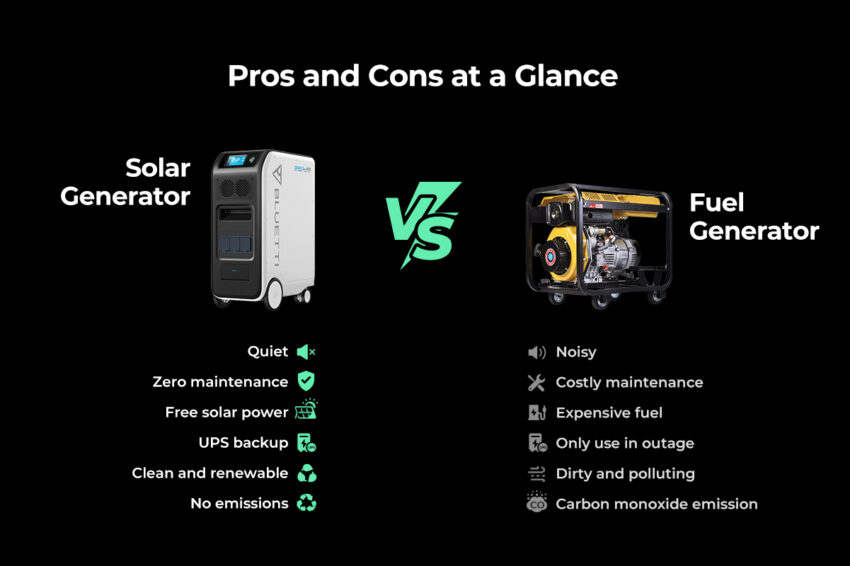Making the Right Choice for Power Outages and Outdoor Adventures: Solar or Fuel Generators?
Generators play a crucial role in providing power during emergencies, such as power outages, as well as ensuring a reliable power source for outdoor activities. When considering the right generator for these situations, two popular options emerge: solar generators and fuel generators. In this article, we will compare the two types to help you make an informed decision.
How Do Generators Work?
Solar generators harness the power of the Sun to generate electricity. They usually consist of an inverter, MPPT controller(Maximum Power Point Tracking), battery, and photovoltaic panels(PV) that convert sunlight into usable energy, which is then stored in battery for later use.
Fuel generators, also known as conventional generators, converts the chemical energy of gasoline into mechanical energy and then into electrical energy. They are composed of an engine, alternator, oil tank, and various other moving parts. They consume fuels and deliver power for instant use.
Comparison Between Solar and Fuel Generators
Safety:
Solar generators are generally considered safer since they don’t require flammable fuels, eliminating risks such as fuel leaks or harmful emissions. However, improper charging can still lead to explosions.
Fuel generators, on the other hand, runs on fuels and carry certain safety risks. Additionally, they emit exhaust fumes and can not be placed indoors.
Functionality:
Solar generators generally have multiple AC and DC power options for powering modern devices.
However, they may have limitations when it comes to running high-powered equipment or during extended periods of low sunlight.
Fuel generators offer high power output for running larger appliances, yet with limited outlets. They provide consistent power regardless of weather conditions or time of day.
User Experience:
Solar generators operate quietly and are plug-and-play. They require minimal maintenance. Additionally, they are more portable in various sizes.
Fuel generators can be noisy and have a complex system that requires regular refueling and maintenance. Though, they have steel frames or wheels for toughness and mobility, it’s still risky and clumsy to move around.
Cost:
Solar generators have higher upfront costs due to their advanced solar and battery systems. However, once installed, they utilize free solar energy and have fewer long-term operational costs.
Fuel generators have lower initial costs but require ongoing expenses for fuel, which can become expensive over time.
Sustainability:
Solar generators are environmentally friendly and sustainable as they harness renewable energy from the Sun. They do not produce greenhouse gas emissions or contribute to air pollution.
Fuel generators rely on fossil fuels, which are non-renewable and contribute to pollution and climate change.
Which Type of Generator Do You Need?
Choosing the right generator can be easy as long as you determine your power needs and specific application scenarios. Here are two common situations to consider:
Scenario One: Home Backup Power for Power Outages
Suppose you live in an area with less frequent disasters, but there is a possibility of a major hurricane or blizzard each year. You want to be prepared and keep your essential appliances, such as the refrigerator, heater, and some lights, running during power outages. In this case, a gas generator is the ideal choice, because it’s cheap and you just need it for instant power for few times. However, if you need frequent use, consider solar generators, such as BLUETTI‘s AC300 and AC500 models. Aside from 3,000W to 5,000W output, they feature a responsive uninterruptible power supply (UPS) function, taking over your grid power within 20 milliseconds when a blackout is detected. For prolonged power outages during winter, they can still perform well and provide power for several days. They have a expandable capacity by adding extra battery packs, you could customize your backup battery system from 3,072Wh to 18,432Wh.
Scenario Two: Mobile Power for Outdoor Activity
Imagine you are embarking on a weekend camping trip with your friends. As you set up your campsite, you realize you want to charge your phone, power up a portable speaker for some music, and keep your mini-fridge running to store your favorite snacks and drinks. As you are seeking fresh air, quite and peace. Solar generators are the clear winners this time. They offer a range of outlets to plug in your devices and utilize solar panels to collect free solar power for use. The market offers many solar generators with excellent capabilities and portability, such as the BLUETTI‘s AC200MAX and AC200P. With 2,000W power and a capacity of 2,000Wh, they create a mobile power hub to enhance your outdoor activities.
Conclusion
To choose between solar and fuel generators, it’s important to consider your specific needs and compare the pros and cons of each option. In general, solar generators are a mainstream power source for home backup and outdoor activities. They eliminate the risks associated with flammable fuels, offer multiple power options, operate quietly, and require minimal maintenance. Although they have higher upfront costs, they utilize renewable energy and have fewer long-term operational expenses. On the other hand, fuel generators provide high power output and can run larger appliances, but they come with safety risks, require regular refueling and maintenance, and contribute to pollution and higher future spending.


